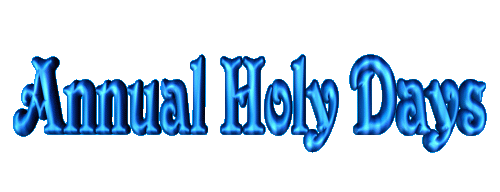
|
|
The
feasts of the Lord consist of the weekly sabbath and the annual festivals --
several other feasts that are celebrated once a year at the appropriate
season. The annual festivals are the following:
Leviticus 23:4 These are the appointed times of the LORD, holy convocations which you
shall proclaim at the times appointed for them.
1. Passover/Pesah -- 14th of
Nisan.
2. Feast of Unleavened Bread -- the week of 15-21 of Nisan*
3. Pentecost/Shavuot--50 days after the sabbath following pesah.***
4. Jewish New Year/ Feast of Trumpets/Rosh Hashanah--1st of Tishri**
5. Day of Atonement/ Yom Kippur--10th of Tishri**
6. Feast of Tabernacles/ Sukkot -- the week of 15th-22 of Tishri*
* These holidays last for a week, but only the first and last day are considered sabbaths.
** This day is considered a sabbath.
*** This day is a sabbath which needs to be counted, it does not fall on the same day each year.
| Therefore there are seven annual feasts which are considered holy convocations (assemblies) in which the people would gather in the temple. In these 7 days no servile work could be done -- they could not work in anything that was their mode of employment. They are sabbaths. |
Temple in Jerusalem |
The celebration of the weekly sabbath serves as a reminder that God, the Creator, is the God that created everything on earth in six days and rested on the seventh day. It defines our God and separates him from imposters. The celebration of the annual holidays also helps us to remember what these festivals represent.
These festivals have an early fulfillment and a late fulfillment. Passover was celebrated first in the land of Egypt with the blood of the sacrificial lamb in order to preserve the Israelites from the plague that was to smite the land of Egypt with the death of every firstborn. Ex 12: 6-14. This feast pointed to a late fulfillment in Jesus/Yeshua, the lamb of God, that was sacrificed for our sins. Jesus tells us to continue to celebrate Passover in his name. Lu 22:19 "and he took bread , and gave thanks, and broke it, and gave unto them, saying. 'This is my body which is given for you: do this in remembrance of me.'
Pentecost/Shavuot is another feast that had an early and late fulfillment. Le 23: 15-21. The early fulfillment was the firstfruits of the harvest. The late fulfillment was the firstfruits of Christian converts which received the holy spirit. Fifty days after the sabbath following the crucifixion of Jesus (Pentecost) a multitude of believers were gathered in Jerusalem when suddenly the holy spirit came upon the apostles of Jesus in the form of tongues of fire coming from their heads. Acts 2:1-4 "And when the day of Pentecost was fully come, they were all with one accord in one place. And suddenly there came a sound from heaven as of a rushing wind, and it filled all the house where they were sitting. And there appeared unto them cloven tongues like as of fire, and it sat upon each of them. and they were all filled with the Holy Spirit, and began to speak with other tongues, as the Spirit gave them utterance." The gathered people also heard them speaking in their native tongues. The coming of the Holy Spirit on the day of Pentecost was the late fulfillment of this festival.
The rest of the festivals (Rosh Hashanna, Yom Kippur, Sukkot) have not had a late fulfillment yet. We are awaiting their late fulfillment. These festivals indicate to us what God's plan is. They help us to understand the purpose of our lives, the reality of paradise and resurrection and how Jesus, the lamb of God, sacrificed for our sins has made all of this possible for us. Baruch ha shem!